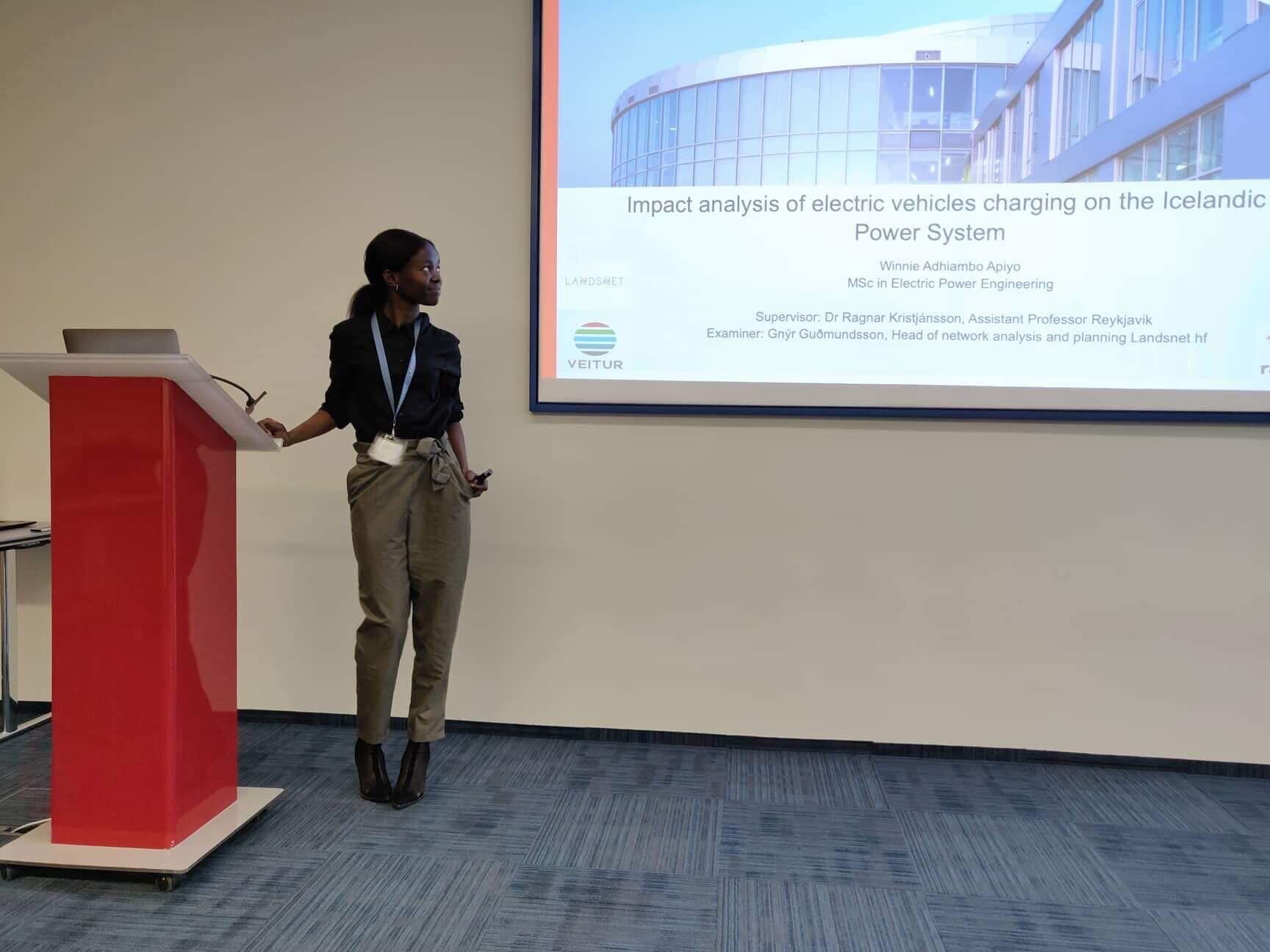MSc Thesis: Impact analysis of electric vehicles charging on the Icelandic Power System
REYKJAVIK, May 25 - MSc in Sustainable Energy Engineering candidate, Winnie Apiyo, successfully defended her master's thesis where she researched the impact that electric vehicle charging would have on the Icelandic power system. Winnie's research project was supervised by Ragnar Kristjánsson from Reykjavik University and was funded by RANNIS.
 As Winnie explains, increased adoption of electromobility in the form of Battery Electric Vehicles and Plug-in Hybrid Electric Vehicles is anticipated in Iceland over the next few years. According to Winnie, electrified transport will lead to increases in system peaks that are higher than the corresponding increases in annual electricity demand.
As Winnie explains, increased adoption of electromobility in the form of Battery Electric Vehicles and Plug-in Hybrid Electric Vehicles is anticipated in Iceland over the next few years. According to Winnie, electrified transport will lead to increases in system peaks that are higher than the corresponding increases in annual electricity demand.
The objective of her research was to assess the likely incremental impact of EVs on both the transmission and distribution networks through evaluating the network reinforcements needed to support the increase in electricity demand and quantify associated costs. To accomplish this, Winnie performed extensive analyses of large data sets of the transmission and distribution grids and transportation data.
As Winnie states in her thesis, the country depends on imported petroleum fuels to meet its transport fuel demand. A transition to EVs is of particular interest for Iceland as electricity can be supplied from low cost clean renewable energy resources. To evaluate how the transition to EVs will impact the system maximum load, four load profiles were defined: BAU, PROPOSAL, PREMIUM and BAN scenarios. The load profile models used for scenario analysis was done by incorporating key fiscal parameters including different taxes on vehicle usage pattern and upfront purchase cost, petroleum fuel tax levies, vehicle tax exempting, extra fees and subsidies.
Winnie created charging profiles for EVs, based on real-life driving data from different traffic zones. The fleet number in each area was estimated based on the population and commercial density of electricity consumption in the regions. This EV load growth was studied in three different loads forecasted assumptions or scenarios: Base case scenario, Upgraded system scenario and the slow progress energy forecast scenario. The scenarios were analysed using two separate Icelandic power system models. The reinforcement needs were quantified for up to 32 years.
The year 2018 was assumed to be the first year PHEVs and BEVs are implemented, while 2050 would allow the sufficient technology time to penetrate the Icelandic vehicle fleet fully. The 2018-2050 long term plan took a strategic view of how the network should be developed to meet future objectives. Five generation portfolios in different geographical locations were defined to cater for the increasing demand as a result of EVs uptake. The different production locations were expected to put various stress on the power system. Steady state power system analysis was carried out using simulations on mathematical models of electrical power and power system components, which play an essential role in both operational control and planning by developing the required mathematical models and then using these models to perform power flow and contingency analysis.
The models Winnie used were the Icelandic base model that simulates a winter period when the load was at its peak and a model that modifies the base model by implementing all the changes as per Landsnet's Network Development Plan 2018-2027. The models were developed in MATPOWER and MATLAB used in automating and simulations. The effect of the electric vehicles in different distinct areas in Iceland are investigated by monitoring thermal and voltage constraints violations in the power system. From her results obtained, Winnie concluded that there is a significant rise in the network peak load. This increase in peak load, Winnie predicts, will originate large voltage drops and the overloading of some network branches.
Congratulations Winnie on an excellent thesis project!
Presently, Winnie is working as a Protection, Instrumentation and Control Engineer at KenGen, the largest power producing company in Kenya.
